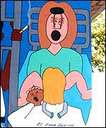For some teenagers, becoming a parent may not be a problem. Yet there are many teenagers who wish they had waited until they were older. Becoming a parent can be a scary, life-changing situation. It can put an end to school days
 or job plans, and teenage parents may not be ready or experienced enough to look after a child.
or job plans, and teenage parents may not be ready or experienced enough to look after a child.Rates of teenage pregnancy vary within the UK too and according to the Family Policy Studies Centre, women in poor inner city areas are six times more likely to get pregnant by the time they are 20 than in wealthier areas.
In 1999, the UK government announced plans to halve the rate of teenage pregnancy by 2010. Reproductive health care is seen as an important way of reaching this target without treating pregnant teenagers as bad or stupid. Instead, with effective reproductive health care, young people can learn the different choices available to prevent pregnancy if they choose to, and teenage parents can receive the support that they need.
Teenagers Worries about a pregnancy they have neither planned nor expected, many young women are forced to drop out of school or give up their jobs. Few know where to go for support.
Young men need support too yet their needs are often overlooked by family planning services. Nevertheless, young men need to learn to take responsibility for their sexual activity, whether to avoid STIs or to understand their roles as fathers.
Some projects are trying to give a real voice to young people, and find ways to help them on their own terms.




